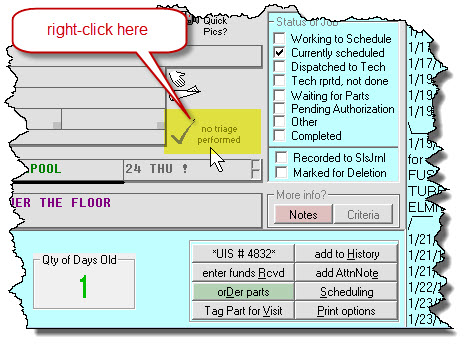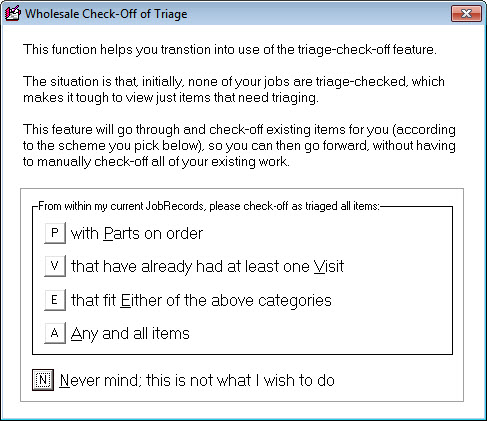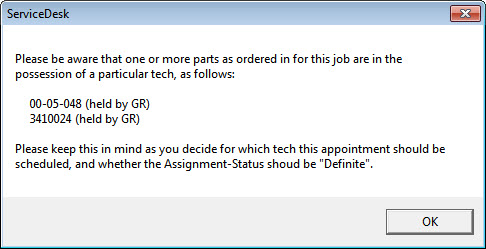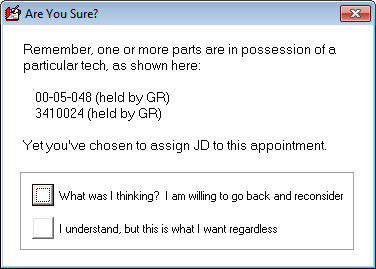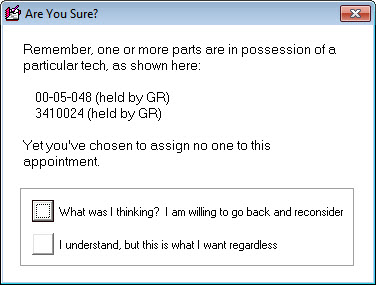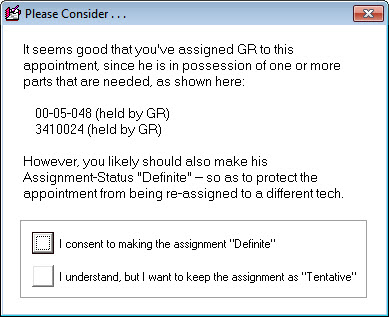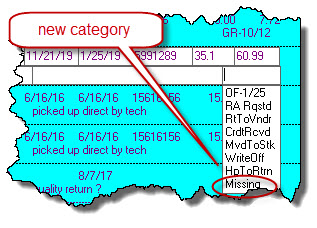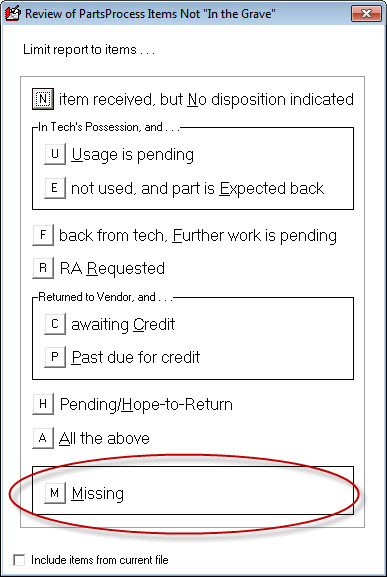ServiceDesk 4.8.79 Update 01/23/19
Easing your transition into full embrace of the Triage system
In the last 15 years, it has become ever-more important for servicers to pre-screen jobs in the effort predict what parts are most likely to be needed, and then attempt (at least where reasonable) to assure the tech is sent out with such parts (whether it's by ordering in such parts ahead of time or by spec-tagging them from inventory). As this need has grown, Rossware has simultaneously invented, added to and bolstered the retinue of tools its systems offer to assist.
One of the early things we did (back in '05) was to create a spec-tagging on inventory feature (search here on "4.1.103"). Formally, the expression refers to "speculatively tagging for potential use on a job" (the device was initially called an "Anticipatory Parts Transfer"). We've made a countless string of improvements in this device ever since, including the fact that, as of this release, spec-tags will be protected from being unintentionally omitted in the course of downward inventory adjustments.
In 2010 we added "pre-screened" as a status in the list of statuses that an appointment can be set to. Though not an ideal method by which to internally distinguish between items pre-screened versus not, it was at least a start.
More helpfully, in 2014 we created an explicit triage-check-off flag in JobRecords, themselves, and made "Items Needing Triage" into a filter category in the JobsPerusal interface (this makes it easy to review the particular items that have not yet been triaged).
Even so, these methods depend on triage being done by persons who have direct access to ServiceDesk -- which meant they were not particularly helpful for servicers that wanted techs to triage their own jobs, or who wanted to employ an outside triage specialist and without giving that person direct access into ServiceDesk.
So, about two years back, we created an online interface (triage.rossware.com) where any credential-supplied person can login, see an appropriate set of upcoming jobs, and perform triage -- with resulting information being automatically pumped directly back to parts-management personnel working in ServiceDesk.
Very shortly thereafter we made it so, when those parts-management personnel receive triage results, with a simple click they may initiate appropriate action on requested part numbers (e.g., creating an internal inquiry and/or part order, creating a spec-tag from inventory, etc.).
In consequence of all the above, we have a powerful set of tools that can very ably address this triaging matter.
Regardless, we've learned that some users, though wanting to embrace this power, have been held back by a silly little obstacle. It is that, for the triaging effort to be easy, you want to presented only with jobs that have not yet been triaged. Yet, if you're only beginning to use the system, all your jobs will show as not yet having been triaged, and that may be overwhelming.
Yeah, it doesn't seem like it would take a lot of work to get past that obstacle, but we understand it's nevertheless held many back.
So, we've made a solution.
If, in a current-JobRecord, you right click on the triage-checkoff flag (i.e., as shown here):
You'll be presented with this option box:
Sure, I could have just shown the above image and thereby (with far fewer words) conveyed what this new option is about. However, I thought a review/summation of triage functionality would be helpful.
Many thanks to Matt Parker (a great internal training resource, BTW) for this suggestion.
Protection against booking Tech-B for an appointment when Tech-A is in possession of one or more required parts
It can be costly, both internally and in regard to how a customer feels toward your company.
Technician A is dispatched to an appointment with one more special-ordered parts. For whatever reason, he does not install one or more such items (though there is still an apparent need to do so), and he does not complete the job. One or more additional parts are ordered. When these parts arrive, standard mechanisms in ServiceDesk prompt toward re-scheduling the job. This is done. Sadly, the person that's doing the scheduling does not realize that Technician A still holds one or more needed parts (perhaps they should have been retrieved back to the office, but they have not been). In the absence of knowing this, and finding that the return appointment can be efficiently scheduled for Technician B, that is exactly what the scheduling person does. The consumer is happy for a good appointment, and all looks rosy until the morning of the appointed day, when it's discovered that Technician B cannot be provided with the needed part because Technician A still has it. You are forced with embarrassment to call the customer and confess your error.
Obviously, excellent software is supposed to watch your back, and should not let this happen!
Thus, ServiceDesk now has a system to directly protect against this scenario (to be clear, the PartsPick system already exists to, among other things, assure retrieval of parts that should be coming back from techs, and that in itself should for most circumstances protect against this kind of thing . . . but that's the operative word: "most" is not the same as "all").
This new protection system begins when a CSR is seeking to schedule an appointment on an already-existing job. Whether that effort is initiated by using the JobRecord's ItemLocate feature to schedule via the DispatchMap, its ZoneLocate feature to schedule via the ZoneScheduler interface, or its straight-scheduling feature to book from directly within the ScheduleList form . . . no matter the method of such initiation . . . the system does a simultaneous behind-the-scenes look into associated PartsProcess data, to see if there is reason to be concerned about a particular tech possessing needed parts. If it finds the answer is yes, it displays a message box that looks something like this:
Thus, the CSR is advised right up-front if there is a matter of concern.
And, it’s not just an advance alert that’s provided. Rather, when a CSR is about to save a new or changed appointment, the system again looks to see if there might be problem. In particular, it looks to see if the CSR is assigning the appointment to a different tech than the one who has in his possession one or more parts that are needed on the job. If yes, it presents a dialog box this:
Or, if the CSR has not assigned any tech at all (i.e., left the appointment unassigned), the system presents this:
Or, if the CSR has chosen to assign the appointment to the tech who has in his possession such parts as are needed, but has neglected to set the assignment status as “Definite,” the system presents this:
Thus, the CSR gets both an advance alert to consider as needed, and, if going ahead and setting up the appointment in an apparently ill-advised manner regardless, he or she gets a further warning, along with an invitation to fix the matter.
And that's not all.
If the CSR does not accede to any of the above (i.e., persists in making an appointment that appears to be ill-advised), ServiceDesk will do two added things.
First, it will provide a further precautionary message (varying in precise form depending on the circumstance, but similar in at least concept to this):
And it will make an entry to the narrative JobHistory, indicating the CSR proceeded as he or she did, in spite of warning otherwise (think of it as tattling on the CSR).
New "Missing" category in PartsProcess HoldLoc
Tony Tyrell of Via Appliance Inc. is the person who receives credit for the item above. He does for this one as well.
Our "Cradle-to-Grave" parts management system is pretty thorough. Its "HoldLoc" dropdown has had categories to described most any situation. But, evidently (and as Tony pointed out), we'd missed one. You can see it added here:
With that new listing, we've also added it as a reporting category in the Cradle-to-Grave screening and report system:

